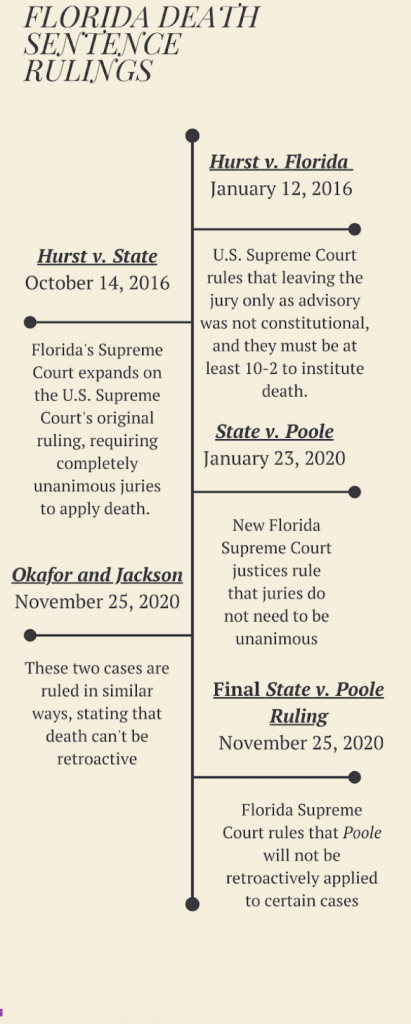Elise Gregg/ Staff Writer
After four years of court cases, Florida’s Supreme Court has decided not to retroactively sentence to death over 100 death row inmates. Instead, they will face new trials.
The decision comes after a January 2020 verdict where the court ruled a jury doesn’t have to be in unanimous agreement to sentence someone to death, lifting the requirement and overturning its 2016 stance, Hurst v. Florida.
As PantherNOW previously reported, this created uncertainty for many death row inmates whose juries were split on a death penalty sentence. They feared the court might apply the new changes, allowing capital punishment to be imposed regardless of jury agreement.
“This is what [the clinic] has been working on since [Hurst v. Florida] first came down…as a result of that, we’ve worked to track death penalty cases [and] how the law is going to apply [to them],” said Hannah Gorman, director of FIU’s Death Penalty Clinic — where the legal battle has been studied the last 5 years.
The changes in the state’s death penalty process started in 2016, when the case Hurst v. Florida, was brought before the Florida Supreme Court and later appealed to the U.S. Supreme Court.
In January of 2016, the U.S. Supreme Court ruled, in Hurst v. Florida, the state’s death penalty process was unconstitutional for keeping juries in a solely advisory role, meaning judges decided the facts for an execution.
The court made several decisions within this ruling that altered Florida’s death penalty process, including requiring juries to vote at least 10-2 to impose a death sentence.
In October of that same year, the Florida Supreme Court agreed with the U.S. Supreme Court’s ruling in Hurst v. State. Moreover, they expanded upon the court’s decision and required total jury agreement to institute the death penalty.
But, four years later, the Florida Supreme Court changed mind.
In January 2020, in State v. Poole the court decided the U.S. Supreme Court’s ruling (Hurst v. State) was based on an incorrect interpretation of Hurst v. Florida. The current justices reversed the court’s verdict and removed the jury unanimity requirement.
This raised questions for over 100 death row inmates not sentenced to death due to a lack of jury consensus.
The Florida Supreme Court still had to determine how State v. Poole would apply to the inmates when two rulings in November established all will face new trials, instead of being sentenced to death.
The decisions to allow new trials were made in State v. Okafor and State v. Jackson, which determined the death penalty could not be applied retroactively.
Gorman said while the proceedings took time and were extremely complicated, the decision is important to both the inmates and the state’s legal community.
She explained Florida’s Attorney General Ashley Moody requested in both cases, Okafor and Jackson, the Florida Supreme Court reinstate the death penalty, arguing State v. Poole made it mandatory.
However, in both cases the judges ruled the death penalty was not required.
“That’s when the state appealed and that’s how we get to the Florida Supreme Court,” said Gorman.
In State v. Okafor, state officials asked the Florida Supreme Court to apply the death penalty to Okafor based on the State v. Poole decision. The Court refused, stating in their opinion that “our judgment vacating Okafor’s death sentence is final, that neither we nor the trial court can lawfully reinstate that sentence, and that resentencing is therefore required.”
Similarly, in State v. Jackson, the state petitioned the Florida Supreme Court to direct the circuit court to reinstate Jackson’s death sentence, or forbid resentencing. The court denied this petition, and the circuit court went forward with resentencing instead of applying the death penalty.
The court’s decisions certified inmates won’t be sentenced to death because their cases had split juries, and will go through new trials to be resentenced. In the court’s decision, the same justices that removed the jury unanimity requirement in January of 2020 ruled applying the death penalty would be an extralegal move.
According to Gorman, although the court rescinded the jury unanimity requirement in Hurst v. State, there’s no way to retroactively apply the death penalty because Poole was not entirely decided at that time.
“Orders vacating death are final,” she said. “That means there’s no legal vehicle [for implementing capital punishment], no matter what court you are at.”

While Poole was sentenced to death, the Okafor and Jackson cases establish the grounds for relief for over 100 inmates.
Essentially, Gorman says, In November, it was determined inmates were eligible for the same relief originally granted by Hurst because of the Okafor and Jackson cases, and the state missed its chance to appeal this relief.
Both Okafor and Jackson had the same outcome but did so in different ways because of how the cases were presented and handled.
“Basically, there’s different rules [and] cases that the state attempted to argue, [saying] that they should still be allowed [to appeal],” said Gorman, “but [the Florida Supreme Court] found against all of those.”
Now, no state court has the authority to reopen death row cases, mandating new trials for the death row inmates.
But, these trials aren’t just a do-over for inmates: putting prisoners in a pre-trial status means resentencing in the context of everything that has happened ever since their original hearings.
“We have to go again and that is that requires a lot of work, a lot of reinvestigation,” said Gorman including compiling new research, re-gathering witnesses, and even finding new ones to testify.
“Also, the reality is…people who sit on death row deteriorate,” Gorman added. “So it might be that some people are no longer competent….it could be some people…didn’t have a severe mental illness then, but they do now.”
Gorman explained the trials won’t necessarily prevent inmates from receiving death sentences: it’s simply another chance in court.
“For those who are pre-trial…they [may] plead negotiations [and] plead guilty in exchange for a life sentence as opposed to a death sentence,” said Gorman.
However, undergoing new trials can also negatively affect inmates.
“While [negotiations] may be a good deal to avoid death for those where there’s overwhelming evidence of guilt, it’s worrying, because the pressure with the pandemic and the backlog of cases we had already…means that you may be exerted beyond what you should be,” Gorman said.
Although the Florida Supreme Court’s recent decisions are significant, Gorman expects more challenges to them in the future. And, while these new trials draw huge amounts of litigation, the rulings granted over 100 death row inmates another shot at court.


Be the first to comment on "Over 100 Florida Death Row Inmates Get Another Shot at Court"